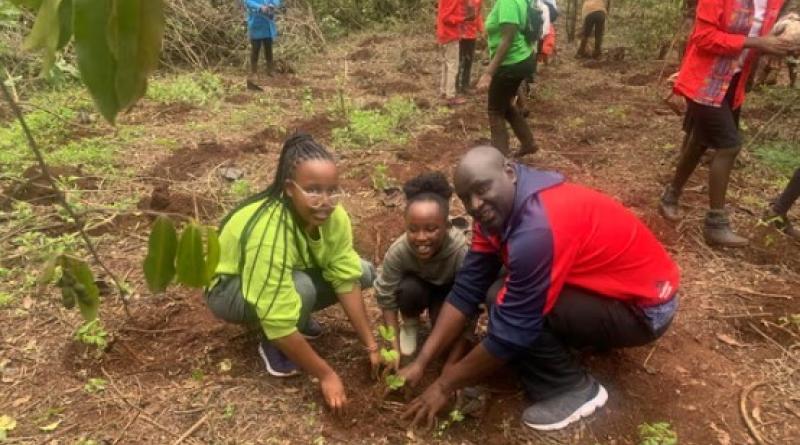‘It was incredible to see’: Kenyans dig deep on first national tree planting day

Government sets up national holiday in hope of planting 15bn trees by 2032 to tackle climate crisis and deforestation
Geoffrey Mosoku and his two daughters have been digging a seedling deep into the ground of the Ngong forest in Kenya’s capital, Nairobi.
“It can become part of Kenyan culture to do environmental work,” said Mosoku, as he and his daughters tapped the tree into place in the natural forest a few kilometres from the city centre. The trio were one of hundreds of people who showed up at the forest on Monday to plant saplings for Kenya’s first national tree planting holiday despite heavy morning rains.
The public holiday, announced last week, is part of a government initiative to plant 15bn trees by 2032 to tackle the climate crisis and deforestation amid worsening impacts such as a severe drought in the country and the wider Horn of Africa region.
Government officials led tree-planting activities in different areas of the country and the environment minister urged the public to participate rather than use the holiday “to attend to other private and social obligations”. Seedlings were available to the public through local forest agencies and chiefs’ offices across the country.
“Conservation of the environment is the urgent and collective responsibility of our time,” the Kenyan president, William Ruto, who launched tree-growing activities in Makueni county in eastern Kenya, said on X, formerly known as Twitter.
While the government’s tree-planting initiative has been widely welcomed, Ruto has faced some criticism for what environmental groups see as double-speak on conservation issues. He removed a six-year logging ban earlier this year, allowing old trees to be cut down for economic activity, saying that a number of old trees were wasting away. Environmental groups opposed the lifting of the ban, saying it would increase illegal logging.
As the morning rains subsided, roadsides and forests in Nairobi were a hive of activity. Hundreds of cyclists plied different routes, stopping to plant trees along major roads and cemeteries.
Families, environmental groups, students, government officers and forest rangers plodded through muddy grounds in the Ngong forest with saplings in hand. A group of landscapers said they had been doing forest clearing and digging for nearly a week in preparation for the day’s activities.
Some Kenyans said the surprise holiday was too sudden to allow them to plan around it, find out about designated planting sites or travel upcountry to plant in their village homes. Others, like Mosoku, hope that the tree-planting holiday can become a regular event like Rwanda’s monthly national cleanup days. Rivers in the Kisii highlands where he comes from have thinned over the years, with wetlands destroyed by the planting of water-consuming eucalyptus trees. He has also been saddened by changing rain patterns that have made rural communities in his home town more vulnerable to food insecurity.
The government aimed to plant 100m seedlings on Monday. Official counts of seedlings used have not yet been released. It has also announced plans to plant a few hundred million more before the end of the short rainy season in December, and launched an app called JazaMiti (Swahili for “fill with trees”) where users can document their planting activity and find real-time updates on nationwide tree-planting efforts. The app contains information on dates of reforestation efforts, the regions they are taking place, tree nurseries nearby and the individuals, organisations or government bodies involved. It also helps users select the tree species suited to their location.
According to a November 2023 government report, data on the app will be verified every four months each year, and awards and certificates of green conduct given to “outstanding tree planters”.
“The environment is everyone’s responsibility – everyone has to make a contribution,” said Elizabeth Wathuti, an environmental activist who took part in tree-planting activities in Makueni. She lauded the planting of indigenous trees and the local community turnout.
“It was incredible to see so many people asking where they could plant trees or get seedlings,” she said. Her family, friends and colleagues also took part in the activities. “It shows that more people are beginning to take the issues of conservation seriously, and having a national tree planting holiday shows political goodwill and intentionality.”
Wathuti said seeing the plants to maturity was crucial. “Tree planting is just the beginning of the exercise – we have to have a lot of follow-up, and promote the culture of people ‘adopting trees’ within the area,” she said.
Environmental groups in Mathare, one of Kenya’s largest informal settlements, used the tree-planting holiday to campaign against environmental access inequalities. Community members chanted environmental justice slogans as they planted trees at the Mathare green park. Local groups from the area have been involved in greening efforts throughout the year, such as clearing rubbish from certain areas to create room for a small community park, but say they face serious constraints.
“We plant trees to give people hope of a more dignified life but there is barely any space to grow trees, so we are forced to plant near sewer lines or garbage lots, so we are also planting today to create awareness about [these] inequalities,” said Muchangi Nyaga, coordinator of an ecological justice campaign at the Mathare Social Justice Centers.






